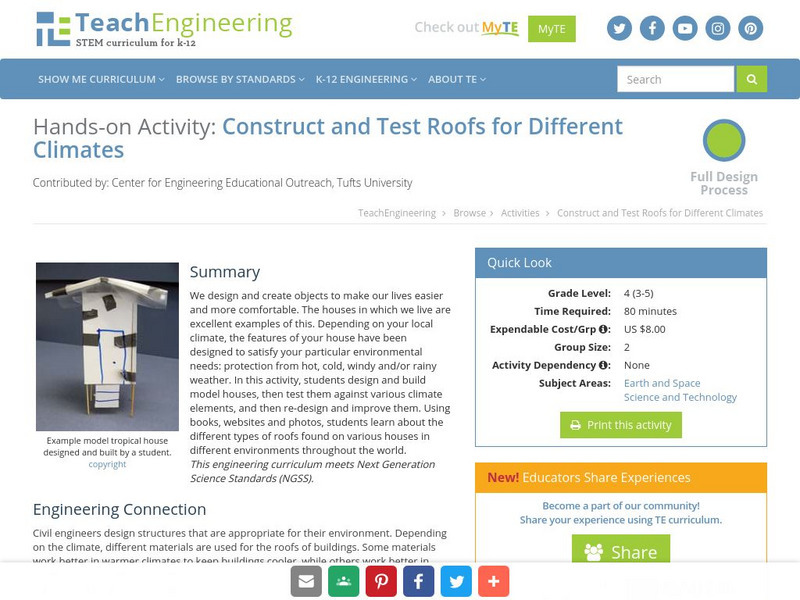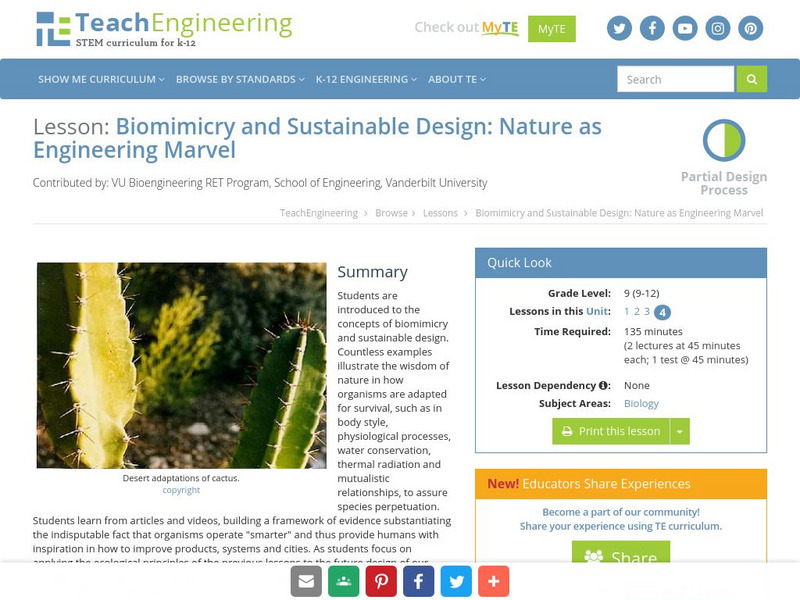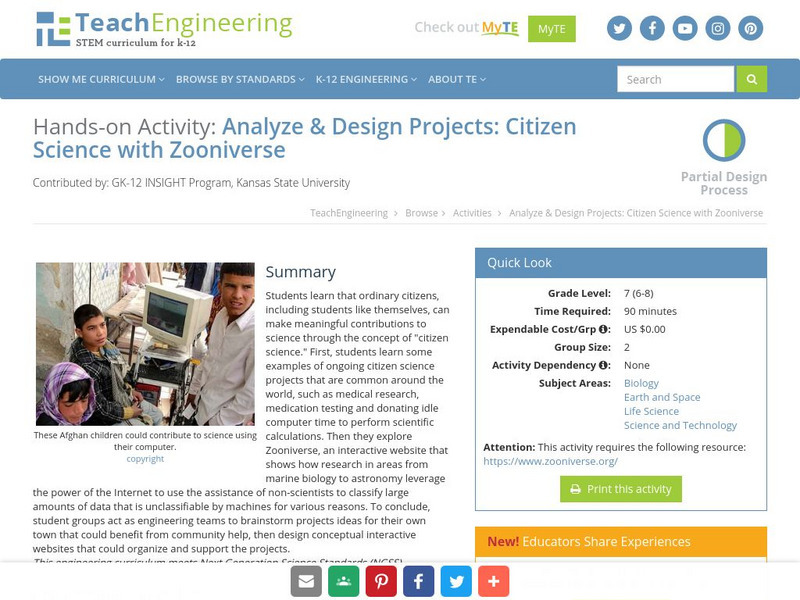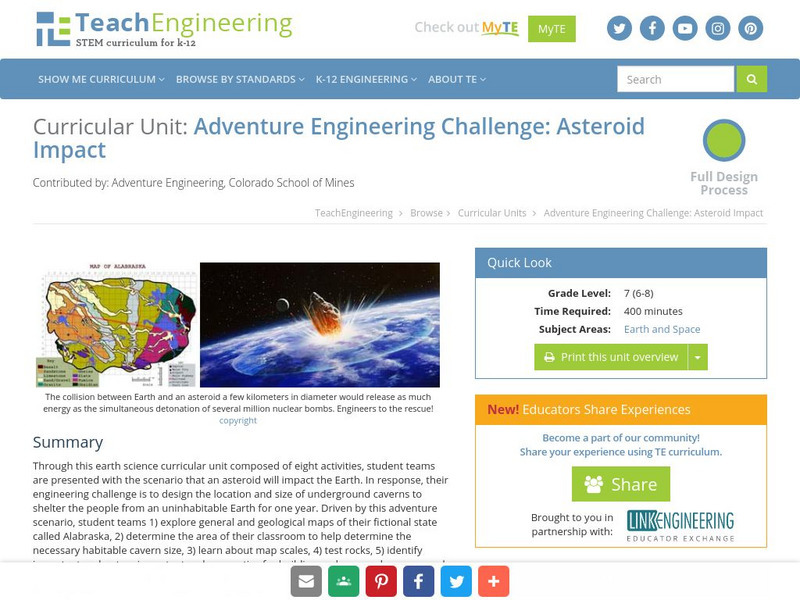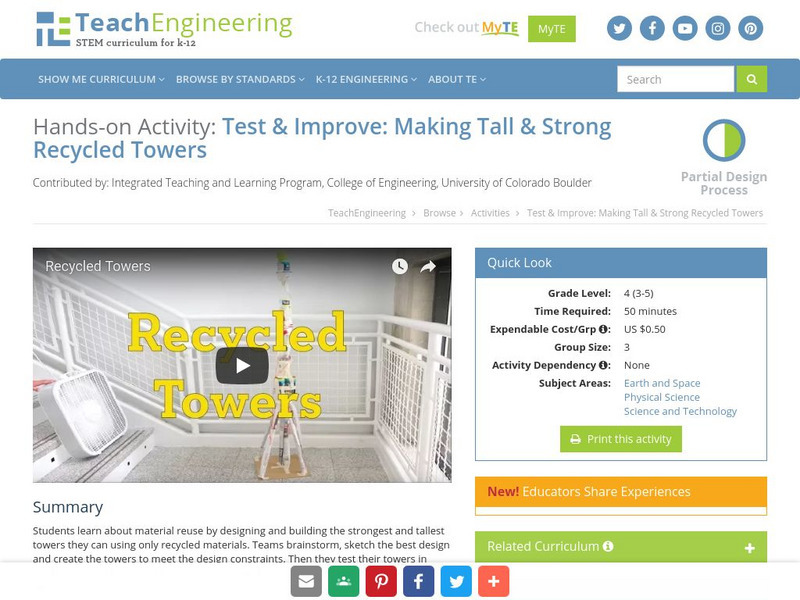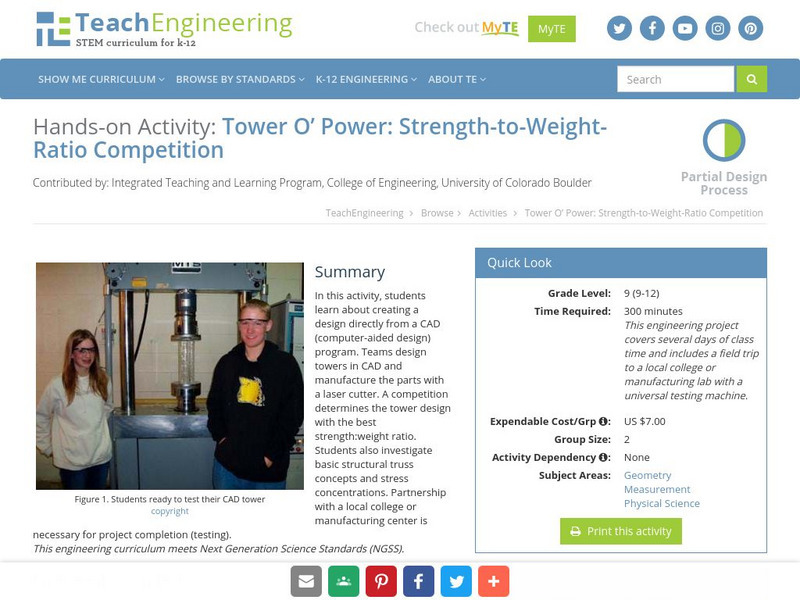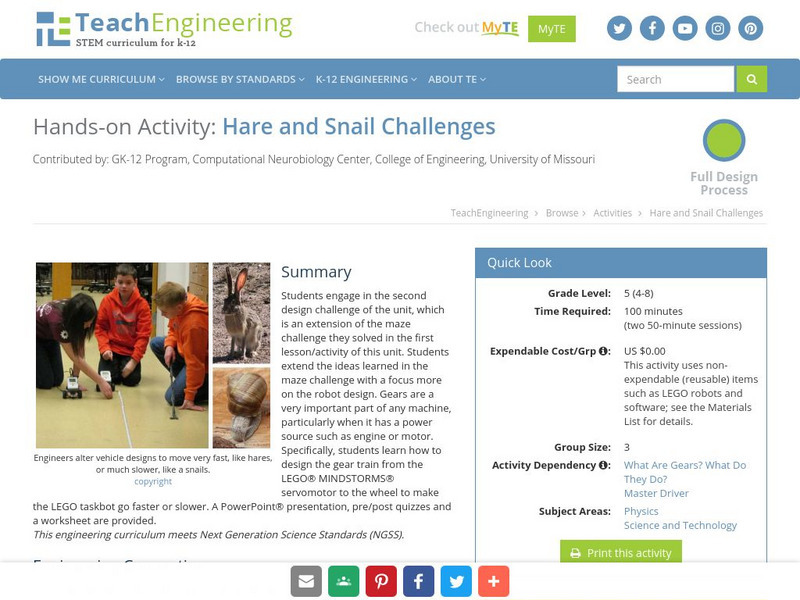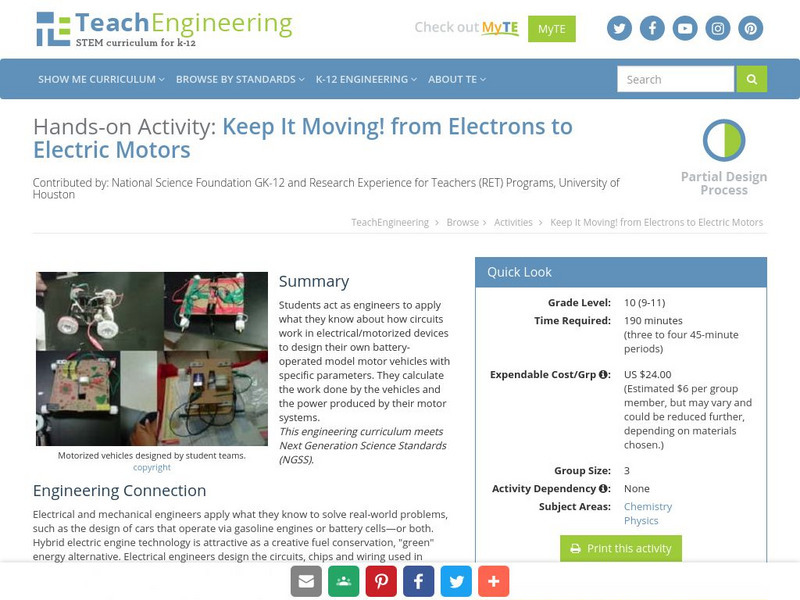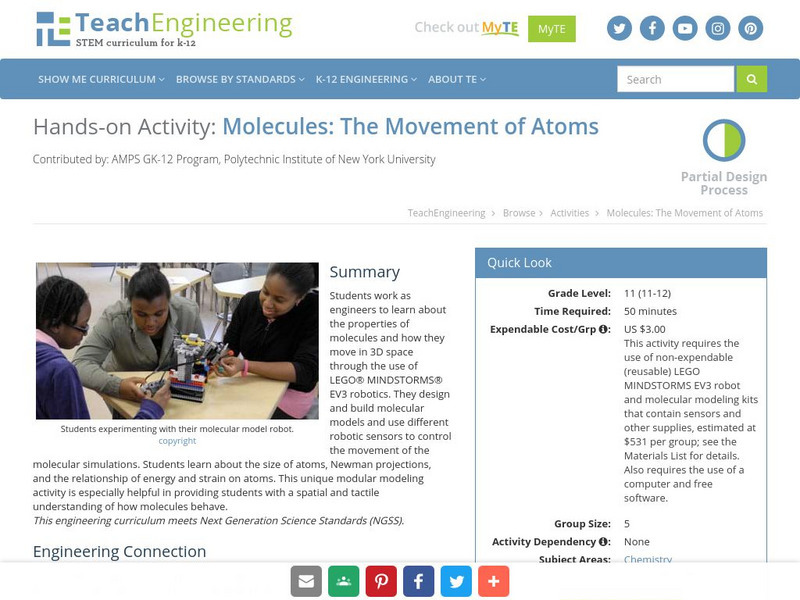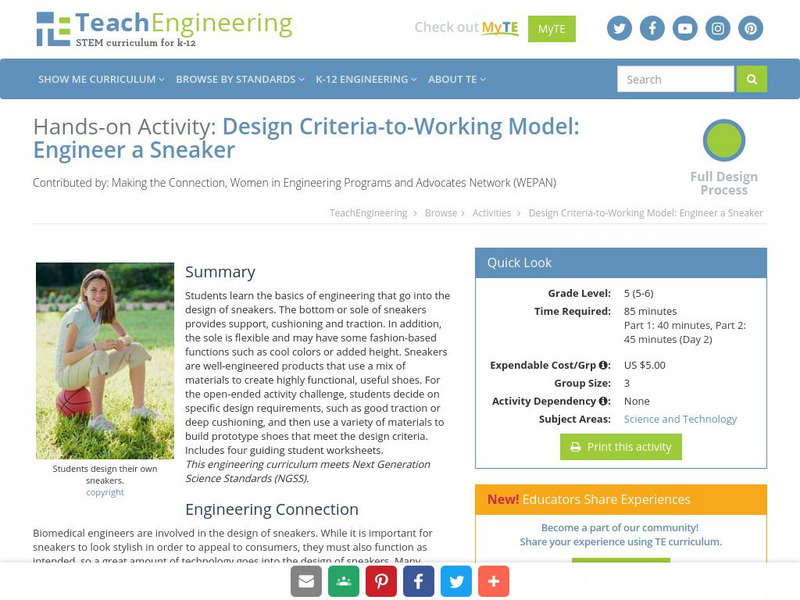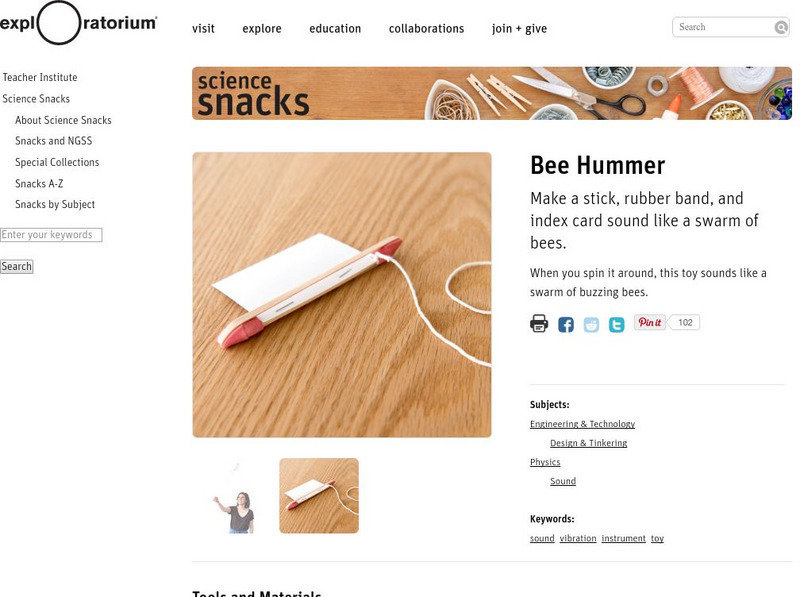TeachEngineering
Teach Engineering: Tippy Tap Plus Piping
The Tippy Tap hand-washing station is an inexpensive and effective device used extensively in the developing world. One shortcoming of the homemade device is that it must be manually refilled with water and therefore is of limited use in...
TeachEngineering
Teach Engineering: Construct and Test Roofs for Different Climates
We design and create objects to make our lives easier and more comfortable. The houses in which we live are an excellent example of this. Depending on your local climate, the features of your house will be different to satisfy your...
TeachEngineering
Teach Engineering: Materials Properties Make a Difference
Students investigate the materials properties-such as acoustical absorptivity, light reflectivity, thermal conductivity, hardness, and water resistancea-of various materials. They use sound, light and temperature sensors to collect data...
TeachEngineering
Teach Engineering: Nature Is an Engineering Marvel
This lesson introduces students to the concepts of biomicry and sustainable design. Students will learn to illustrate the wisdom of nature by demonstratiing how organisms adapt to their environment.
TeachEngineering
Teach Engineering: Citizen Science With Zooniverse
Students learn that ordinary citizens, including students like themselves, can make meaningful contributions to science through the concept of citizen science. Student groups act as engineering teams to brainstorm projects ideas for...
TeachEngineering
Teach Engineering: Asteroid Impact
Asteroid Impact is an 8-10 class long (350-450 min) earth science curricular unit where student teams are posed with the scenario that an asteroid will impact earth. They must design the location and size of underground caverns to save...
TeachEngineering
Teach Engineering: Recycled Towers
Students learn about material reuse by designing and building the strongest and tallest towers they can, using only recycled materials. They follow design constraints and build their towers to withstand earthquake and high wind simulations.
TeachEngineering
Teach Engineering: Tower O' Power
In this activity, students learn about creating a design directly from a CAD (computer-aided design) program. They will design a tower in CAD and manufacture the parts with a laser cutter. A competition determines the tower design with...
TeachEngineering
Teach Engineering: Does Your Chewing Gum Lose Its Flavor?
In the first part of the activity, each student chews a piece of gum until it loses its flavor, and then leaves the gum to dry for several days before weighing it to determine the amount of mass lost. This mass corresponds to the amount...
TeachEngineering
Teach Engineering: Zero Energy Housing
Students investigate passive solar building design with a focus solely on heating. They learn how insulation, window placement, thermal mass, surface colors, and site orientation play important roles in passive solar heating. They use...
TeachEngineering
Teach Engineering: Homeward Bound
Students review the what they have learned throughout the five lessons in this unit. This includes a review of many types of engineers, reminding students of the various everyday products, structures and processes they design and create...
TeachEngineering
Teach Engineering: Air Pollution
Students are introduced to the concept of air quality by investigating the composition, properties, atmospheric layers and everyday importance of air. They explore the sources and effects of visible and invisible air pollution. By...
TeachEngineering
Teach Engineering: Solar Water Heater
Student teams design and build solar water heating devices that mimic those used in residences to capture energy in the form of solar radiation and convert it to thermal energy. This thermal energy is next transferred to water (to be...
TeachEngineering
Teach Engineering: Hare and Snail Challenges
Students extend the ideas learned in the maze challenge in this unit with a focus more on the robot design. They learn how to design the gear train from the LEGO MINDSTORMS NXT servomotor to the wheel to make the LEGO taskbot go faster...
TeachEngineering
Teach Engineering: Keep It Moving! From Electrons to Electric Motors
Students act as engineers to apply what they know about how circuits work in electrical/motorized devices to design their own battery-operated model motor vehicles with specific paramaters. They calculate the work done by the vehicles...
TeachEngineering
Teach Engineering: Cars: Engineering for Efficiency
Students learn how the aerodynamics and rolling resistance of a car affect its energy efficiency through designing and constructing model cars out of simple materials. As the little cars are raced down a tilted track (powered by gravity)...
TeachEngineering
Teach Engineering: Pump It!
Pumps are used to get drinking water to our houses every day! And in disaster situations, pumps are essential to keep flood water out. In this hands-on activity, student groups design, build, test and improve devices to pump water as if...
TeachEngineering
Teach Engineering: Molecules: The Movement of Atoms
Students work as engineers to learn about the properties of molecules and how they move in 3D space through the use of LEGO MINDSTORMS NXT robotics. They design and build molecular models and use different robotic sensors to control the...
TeachEngineering
Teach Engineering: My Mechanical Ear Can Hear!
Students are introduced to various types of hearing impairments and the types of biomedical devices that engineers have designed to aid people with this physical disability.
University of California
South Coast Science Project: Mimicking Plants and Animals Lesson Plan
In this lesson, young scholars are challenged to think about external features that animals and plants have that humans have copied. Students then apply their engineering skills to design a jacket. In addition, this activity introduces...
TeachEngineering
Teach Engineering: Engineer a Sneaker
The goal is for students to understand the basics of engineering that go into the design of a sneaker. The bottom or sole of a sneaker provides support, cushioning, and traction. In addition the sole is flexible and can have some fashion...
TeachEngineering
Teach Engineering: Newspaper Tower
Students will be challenged to design and construct a tower out of newspaper. They will have limited supplies including newspaper, tape, and scissors since engineers are often restricted by economic reasons as to how much material they...
Science Buddies
Science Buddies: Design Requirement Examples
The design requirements for a science project will differ from those of anyone else because it will apply to a specific problem statement and the product, system, or experience that is being designed. In the table, are some examples of...
Exploratorium
Exploratorium: Science Snacks: Bee Hummer
An engineering design project to use simple materials to make an instrument to mimic the sound of a swarm of bees.



